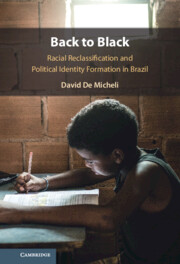Book contents
- Back to Black
- Back to Black
- Copyright page
- Epigraph
- Contents
- Figures
- Tables
- Acknowledgments
- 1 Introduction
- 2 The Puzzle of Racial Reclassification
- 3 Theory
- 4 Education as a Mechanism of Exposure
- 5 Education and Reclassification
- 6 Affirmative Action and Reclassification
- 7 Implications for National Politics
- 8 Conclusion
- References
- Index
5 - Education and Reclassification
Testing the Hypothesis
Published online by Cambridge University Press: 14 November 2024
- Back to Black
- Back to Black
- Copyright page
- Epigraph
- Contents
- Figures
- Tables
- Acknowledgments
- 1 Introduction
- 2 The Puzzle of Racial Reclassification
- 3 Theory
- 4 Education as a Mechanism of Exposure
- 5 Education and Reclassification
- 6 Affirmative Action and Reclassification
- 7 Implications for National Politics
- 8 Conclusion
- References
- Index
Summary
Chapter 5 rigorously tests the observable implications of the argument with longitudinal analysis. I conduct two panel analyses that isolate the effects of educational expansion from the “contaminating” effects of affirmative action policies. First, drawing on annual household surveys conducted by the census bureau, I construct a synthetic panel of birth cohorts to test the hypothesis that better-educated Brazilians situated in the lower classes are mostly likely to self-darken over time. The analysis supports this hypothesis and finds that this relationship holds across diverse cultural regions of Brazil. Next, I introduce an original panel dataset of Brazilian municipalities in 2000 and 2010 to explore whether spatial variation in educational expansion causes higher rates of reclassification within Brazil. Fixed-effects analysis again supports the hypothesis, showing that greater rates of high school and university attendance correlate with greater black identification. Additional analysis indicates that the hypothesized patterns are clearest in urban centers, and are not conditional on the presence of state-level affirmative action policies.
- Type
- Chapter
- Information
- Back to BlackRacial Reclassification and Political Identity Formation in Brazil, pp. 132 - 170Publisher: Cambridge University PressPrint publication year: 2024

